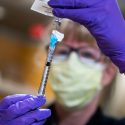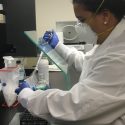Video Badger Talks: The delta variant
First there was alpha. And then there was gamma. Now, we’re hearing more about a new, more infectious version of the virus responsible for COVID-19, called delta.
Devlin Cole, a preventive medicine resident at the University of Wisconsin School of Medicine and Public Health, talks about the risks associated with the delta variant, which can spread more easily between people than earlier versions of the SARS-CoV-2 virus.
“Luckily, our vaccines — all of the kinds of vaccines that we have in the United States — have been shown to be effective even against this delta variant, so we continue to have protection when we are getting vaccinated,” Cole says. “But we do now have even more increased risk of getting very, very sick if we’re not vaccinated.”
Cole breaks down the risks to unvaccinated and vaccinated people. She discusses the risks of vaccinated people passing the virus to unvaccinated children and immunocompromised family members, and talks about what to make of changing mask guidance in different parts of the world.
She shares optimism: Vaccines are likely on their way this fall to children under 12, and data shows that, even now, children in highly vaccinated communities are better protected from exposure to the virus.
And for those who are already vaccinated, she urges: “Have confidence in your vaccine … Getting vaccinated is the single best thing you can do to protect yourself from COVID-19, including variants.”
Cole’s comments are in a new episode of Badger Talks, an interview series produced by UW–Madison University Communications.
Tags: Badger Talks, covid-19, health, video



